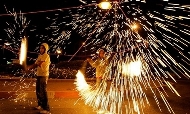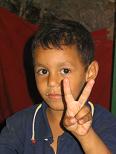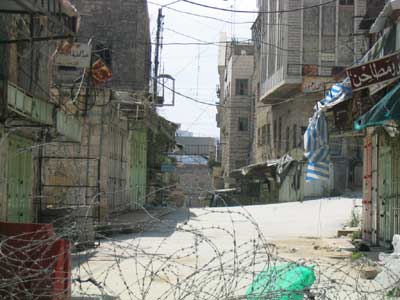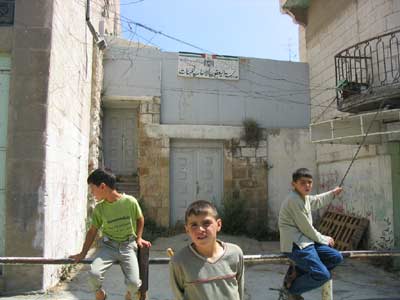This week I learned what it feels like to be a Palestinian. We set out on a research trip to Nablus and found that nearly every step of the way was punctuated by the deliberate harassment that Palestinians live with every day. At first, our trip was almost thwarted when a bad-tempered Israeli soldier decided to deny me and a friend access to the city at the Huwwara checkpoint. Aptly dubbed by Palestinians as the “Humiliation Place,” the Huwwara checkpoint at the edge of Nablus is known for its aggressive soldiers with nasty manners and tempers to match. It was not a surprise, then, that it was here that a traveler carrying an American passport like myself would get a true taste of how Israeli soldiers of the occupation treat Palestinian civilians. When we reached Huwwara, the soldier in charge, hardly more than a teenager, arbitrarily decided he would not let us through the checkpoint. He gave no plausible reason. Perhaps he was simply “in a mood.” Perhaps it is a deliberate form of psychological warfare. Palestinians suffer regularly from the unanticipated disposition swings of Israeli soldiers who patrol their streets and block their roads. And this week, I did too.
After a lengthy verbal exchange with the soldier, we retreated reluctantly. An hour later, we returned with our own kind of improvised armor. Ironically, the only way we could get by the checkpoint and its foul-tempered guardians was as passengers in an Israeli taxi, in which we passed without a second glance from the soldiers. The stark difference in treatment reminded us once again that, even though we could step briefly into Palestinian shoes, we would never know what it is like to inhabit them permanently. We were American citizens again – albeit Americans slipping through the mountains to a city to which we had just been denied entry by an M-16-bearing military officer – and as such were privileged with much broader rights.
Still, we had not crossed the main checkpoint and so had to resort to a winding trip through the mountains. It was also interrupted – this time by a band of four Israeli soldiers, two of whom were singing as though intoxicated, sitting at the side of the road constructing their own kind of temporary checkpoint – again, arbitrarily. Our taxi driver helped us convince them to let us pass, and finally we reached Nablus safely and proceeded with our original plans. We entered the run-down, battered and dusty Balata Refugee Camp, which we learned is the home to about 20,700 people, none of whom is without a story about how the Israeli occupation has affected their lives.
There is Kefah Abu-Hamadah, age 34, who last year during the Israeli invasions rushed out of her house in the middle of the night to the aid of two Palestinians who lay injured in the street. Without warning, a soldier aimed and shot at her, point blank. Her left arm was struck by the bullet and is now paralyzed. Her daily activities severely debilitated, Kefah told us proudly that if she could do it all over again, she would do the same thing. This is what it feels like to be a Palestinian.
There is the family of Ra’ed Fatah, a vegetable vendor, who used to sell his wares in the center of Nablus every day, until he was killed last year by ordinance delivered from above by the vicious American-made Apache helicopters responsible for so many Palestinian deaths here. He was only 29 years old, and now his three children are fatherless. Just two years old when her father was killed, Aram Fatah announced to her mother that she wanted to go to the “sky and bring him home”. The family struggles without their father, with barely enough food to get by. This is what it feels like to be a Palestinian.
There is An’am Khleb Salmieh, who was at home with her five small children when the Israeli army rolled up to it in their mammoth tanks and started firing. The family was inside when two bombs hit. They survived and ran to the neighbors where they watched the rest of their house crumble under the weight of Israeli army shelling. They were among the 900 people left homeless by Israel’s house demolitions in Balata in spring 2002. As if this wasn’t sufficient, Israeli soldiers violently arrested An’am’s husband, blindfolding him and detaining him without charges for two weeks. With the help of humanitarian aid the house was rebuilt, but today it remains empty – all their worldly goods were crushed by the demolition tanks – and they cannot afford new furnishings. This is what it feels like to be a Palestinian.
There is the family of an Al-Aqsa Martyrs Brigade leader, who faced disproportionate punishment for his political activity, when Israeli Apache helicopters singled out his house with lasers and then let loose. This particularly Israeli brand of collective punishment left no one in the area unharmed; the suspect’s house was demolished and four houses nearby were also partially destroyed. The effect on the children living there has been incalculable– their grandfather reported that they cry constantly, their school grades have sunk, and they are afraid and nervous. This is what it feels like to be a Palestinian. Extensive
And there is Ashraf ‘Anati, living outside of the refugee camp, who wears the image of the man who was to become his brother-in-law around his neck, keeping the memory of his beloved friend close to his heart. The man in the picture is Nidal ‘Abidaat, who was shot to death by Israeli soldiers outside ‘Anati’s home, after they had cut off the electricity, gas, and water from all the homes in the neighborhood for a week. The soldiers then herded ‘Anati’s eighteen-person family into one room and threatened to shoot anyone if they so much as put a foot out the door. ‘Anati himself was detained at Huwwara detention center and upon release was stripped and forced to walk the five kilometers home naked. This is what it feels like to be a Palestinian.
Leaving Nablus the next day, we had to pass the “Humiliation Place” again. As we approached, we saw three soldiers arguing with a large group of Palestinian men, who they appeared to be detaining or otherwise harassing. It was not a surprise to us when we saw the brutish soldier from the previous day who had denied us entry, yelling loudly among the others. As we passed, I turned back, looked him in the eye, and tossed him a friendly wave. He recognized me immediately and bolted from the group, hustling toward me. Surprised and flustered, he blurted out a rapid succession of questions: “Where did you come from?” “How did you get through?” “What are you doing here?” I looked ahead and kept walking, answering coolly, “I don’t know what you’re talking about. I’m going to Jerusalem.” We walked on and he stood gaping after us. It was a small, sweet moment of victory for us. But the pleasure of that instant was overwhelmed by all the destruction, loss, and heartache suffered by Palestinians in Balata refugee camp, at this checkpoint, and throughout Nablus. The words of a woman living in the refugee camp rang in our ears. When we asked her where she lived, she told us simply, “In hell.” That is what it feels like to be a Palestinian every single day.
Leila Saad is a graduate student at Harvard University at the John F. Kennedy School of Government.








